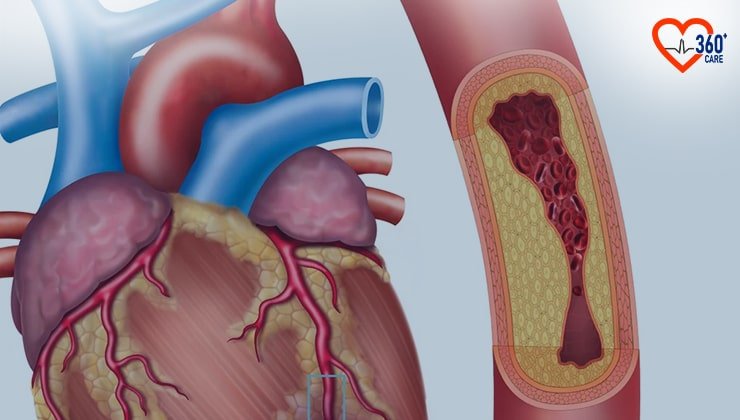Heart blockage is one of the leading causes of mortality worldwide. While there are many diagnostic tests at hospitals to detect heart blockages, some signs, and self-assessment methods can be done at home to detect it at an early stage.
Keep reading to learn about some common signs of heart blockage and how to detect it at home.
What Is Heart Blockage?
Heart blockage occurs when a fatty substance known as plaque accumulates in the arteries that supply blood to the heart. If excess plaque accumulates, it will lead to a complete blockage and may result in a heart attack.
Understanding The Symptoms Of Heart Blockage
The type of symptoms may vary depending on the degree of heart blockage. It develops slowly over many years.
The common symptoms of heart blockage are
- Chest pain or discomfort: It presents as squeezing, pressure, or tightness in the chest and may radiate to the shoulders, arms, neck, jaw, or back.
- Shortness of breath: Observed especially while lying down or performing physical activity.
- Irregular heartbeat: If you notice skipping or irregular beats, it is important to monitor and consult with a healthcare professional.
- Swelling in legs, ankles, or feet: Swelling in the legs, ankles, or feet may occur when the heart is not pumping blood effectively.
How To Check Heart Blockage At Home?
There are several ways to monitor the heart health at home. However, if you notice symptoms, it is essential to consult a healthcare professional for definitive diagnostic tests, including ECG, stress tests, or coronary angiography.
Understand the risk factors- family history
Evaluating and understanding your personal risk factors for heart blockage is important. Some of the key risk factors include
- Family history of heart disease
- High blood pressure
- High cholesterol
- Obesity
- Diabetes
- Smoking and Alcohol consumption
- Monitor your pulse
You may monitor your pulse to detect irregularities in your heart rate.
The different steps to monitor your pulse are
- Sit down or lie down in a quiet place.
- Use the tips of your index and middle fingers to press lightly over the artery on your wrist or side of the neck.
- Count the number of beats in 30 seconds and that multiplied by two will give beats per minute.
The average resting heart rate for adults ranges between 60-100 beats per minute. It is important to consult your healthcare provider if there are irregularities.
Monitor your blood pressure
High blood pressure is one of the most significant risk factors for heart disease and may signal the presence of heart blockage.
You may use automatic blood pressure monitors to monitor your blood pressure especially if you are at risk for heart disease.
The different steps to follow are
- Sit in a chair and rest for three to five minutes.
- Slip the cuff onto the bare upper arm above where the elbow bends. Tighten it so that you can fit only two fingers under the cuff.
- Press start and record the reading in a blood pressure log to track the numbers.
A normal blood pressure reading is around 120/80 mmHg. If there is consistent high blood pressure, seek medical advice.
Use wearable technology
Many individuals are using wearable devices, including smartwatches that may help in tracking heart rate, physical activity, and sleep patterns. Some new models may even detect irregular heart rhythms.
Take the stair test
A stair test is a simple method that people may use at home to assess their heart’s performance. Climb the stairs up and down a set of stairs and monitor your symptoms. If you take longer to recover or if you experience any discomfort, it indicates that the heart is struggling to cope with the exertion.
A study showed that climbing four flights of stairs in less than a minute indicates good heart health. If an individual takes more than one and a half minutes to climb four flights of stairs, then it means your health is suboptimal and it is recommended to consult your doctor.
How To Prevent Heart Blockage?
- Eat a healthy diet rich in fruits, vegetables, and whole grains. Exercise regularly.
- Monitor the symptoms and discuss them with your doctor especially if you are at risk of developing heart disease
- Limit alcohol intake and quit smoking
- Manage stress. Chronic stress may affect your heart health. So, it is recommended to practice techniques that reduce stress, including meditation, exercise, or yoga.
- Take prescribed medications for high cholesterol, and high blood pressure.
Conclusion
At-home diagnostic tests may help in providing valuable insights about your heart health and early detection of heart blockage. However, it can not replace the expertise of professionals.
Heart 360 Care in Chennai is committed to providing personalized care and a holistic approach to cardiovascular health. If you have any concerns about heart blockage or notice any symptoms, do not hesitate to consult a Cardiac specialist, Dr Nikhil of Heart360 Care to get a thorough evaluation and treatment options.
Frequently Asked Questions
You may measure blood pressure at home using an automatic, cuff-style, upper arm monitor. Wrist and finger monitors are not recommended. Support the arm on a flat surface and place the middle of the cuff of the blood pressure monitor on the upper arm, follow the instructions, and note the reading.
The signs and symptoms to know that your artery is blocked are chest pain, shortness of breath, fatigue, pain in other parts of the body, dizziness, nausea or indigestion, cold sweats, irregular heartbeats, and swelling in the legs, ankles, or feet.
The early symptoms of heart blockage are fatigue, chest discomfort, difficulty in breathing, or lightheadedness. It is important to recognize the early symptoms of heart blockage else it may result in a heart attack.
References
- https://www.nhs.uk/conditions/heart-block
- https://www.heart.org/en/health-topics/high-blood-pressure/understanding-blood-pressure-readings/monitoring-your-blood-pressure-at-home
- https://www.advocatehealth.com/health-services/advocate-heart-institute/programs-and-treatments/coronary-artery-disease-program/blocked-artery-symptoms
- https://www.healthcentral.com/condition/heart-disease/how-to-check-for-heart-disease-at-home









